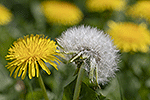• dandelion •
Pronunciation: dæn-di-lai-ên • Hear it!
Part of Speech: Noun
Meaning: A widely distributed weed of the genus Taraxacum having a long tap root and a rosette of deeply notched leaves, bright yellow flower, replaced by a fluffy ball of seeds.
Notes: I hesitated to call this plant a "weed" because it is farmed as a salad in New Jersey and widely eaten here in Pennsylvania. In the spring some people enjoy what the Pennsylvania Dutch call "ham and dandy", boiled ham and fresh spring dandelions.
In Play: Dandelion leaves are bitter, but some people enjoy salads created from them: "Most people kill dandelions with weed-killer, but Chick Pease cuts them, cleans them, and makes salads out of them." Dandelions grow everywhere: "Dandelions have spread all over the world because it is so much fun to blow their seeds."

Word History: Today's Good Word began its life as Old French dent de lion "tooth of a/the lion", for its toothed leaves, a translation of Medieval Latin dens leonis. German has a loan translation of the same phrase: Löwenzahn. Den(t)s was passed down from PIE dent-/dont- "tooth". The Germanic languages took the O-variant, as seen in German Zahn "tooth" and Dutch tand "tooth". Old English removed the N and came to toth, which gave us today's tooth. Latin only slightly modified the PIE word to dens, dentis, ultimate origin of English dental and dentist. Greek added a prefix to come up with odon, seen in the Hellenic borrowings orthodontist and mastodon. Lion was borrowed from French, which inherited it from Latin leo(n) "lion", which borrowed it from Greek leon. Greek borrowed the word from a non-Indo-European language, maybe Semitic, like Egyptian labai or Hebrew labhi. (Today our respect is due Susan Maynard, who saw the fascination in today's Good Word and shared it with us.)


